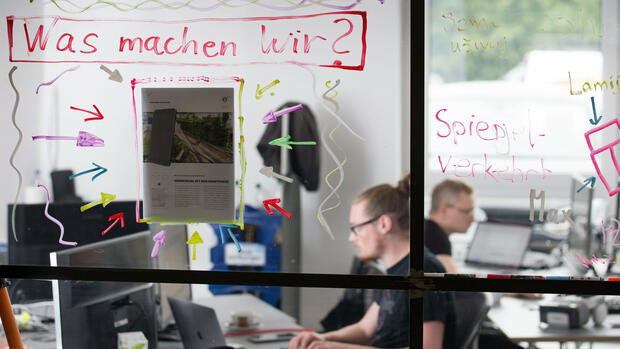The employers’ association sees a lot of catching up to do in Germany in terms of start-up culture, which can lead to innovative business ideas and new jobs.
(Photo: dpa)
Berlin The Confederation of German Employers’ Associations (BDA) is campaigning for a special European start-up visa to signal to founders worldwide that their entrepreneurial ideas are welcome in Europe.
“If Europe is to become more attractive as a location in international competition, we have to boost our innovative strength,” said Employer President Rainer Dulger to the Handelsblatt. “For this we need a Europe with an entrepreneurial spirit for good ideas from all over the world.”
The start-up visa is just one of numerous suggestions that the BDA will publish this Tuesday in a position paper on the European Year of Skills. The aim of the initiative is to give employees the right skills for high-quality jobs and to help small and medium-sized companies in particular to overcome the shortage of skilled workers.
The employers’ association sees a lot of catching up to do in Germany in terms of start-up culture, which can lead to innovative business ideas and new jobs. According to the Institute for SME Research (IfM), the number of commercial start-ups has stagnated in Germany since 2020 at around 240,000 per year.
Measured against their share of the population, migrants already make an above-average contribution to start-ups in Germany, according to the KfW development bank. But especially for start-up founders, the location is only moderately attractive compared to the frontrunners Canada, USA and France, as a recent study by the industrialized countries organization OECD and the Bertelsmann Foundation showed.
Target of start-up visas
A major shortcoming is that Germany does not offer its own start-up visa for people from non-EU countries interested in setting up a business, while other countries sometimes market this very intensively.
According to a current analysis by the Konrad-Adenauer-Foundation (KAS), one fifth of all start-ups in Estonia are founded on the basis of the start-up visa program. According to the business magazine “Forbes”, more than half of the start-up companies in the USA with a minimum value of one billion dollars were founded by immigrants.
The aim of special start-up visas is to attract visionary founders from abroad, who often do not meet the applicable visa requirements for entrepreneurs, writes KAS study author Jana Lajsic. Many OECD and EU countries would have introduced them to be able to keep up with the USA, which attracts most tech founders because of the good financing conditions.
According to Lajsic, there are currently around 30 start-up visa programs worldwide, most of which provide for a temporary residence permit. They target founders with business ideas that can quickly expand into new markets without incurring high costs. In addition to a business plan, applicants are also required to be able to support themselves.
>> Read here: OECD-Study: Germany is not very attractive for foreign academics and entrepreneurs
In Germany, on the other hand, start-up founders from countries outside the EU must apply for a visa and a residence permit for the purpose of self-employment.
Many visa programs are apparently out of the question
According to the KAS analysis, most entrepreneurial visa programs aimed at business people with capital, experience or companies with high turnover rates are not suitable for start-up founders. In addition, it is comparatively difficult for founders in Europe to obtain a permanent residence permit.
Read more about start-ups
In this way, Germany and other countries are wasting opportunities, writes Lajsic: “Especially in a country where there is a lack of courage to found a company, foreign founders could act as a driving force for promoting a start-up culture.”
In the start-up strategy published by the federal government last year, however, no special visa program for innovative founders is planned. Instead, the traffic light coalition is planning a forum for better networking between founders with a migration background.
>> Read here: Founders from abroad complain about discrimination and wasted potential
From the point of view of German employers, improving the conditions for foreign founders is a key to modernizing Europe. According to the BDA paper, this also includes no longer linking access to private or public funding to the residence status of potential founders.
A special European start-up visa should be “quick and easy to implement and create attractive framework conditions,” says Employer President Dulger.
More: German universities are producing more and more start-ups

